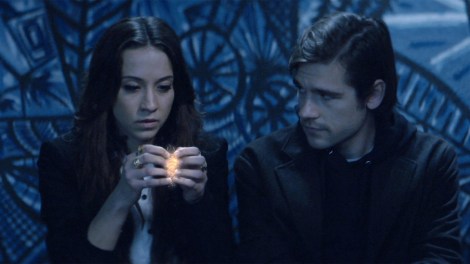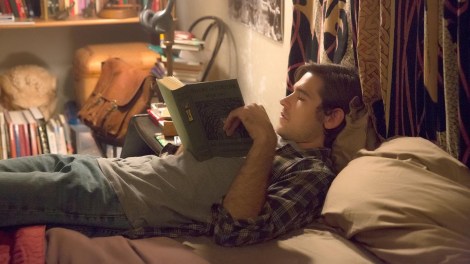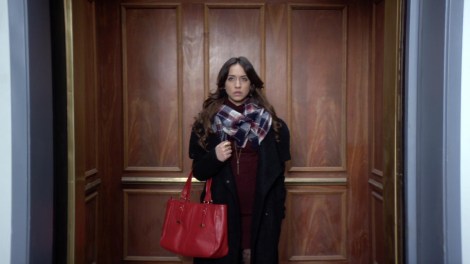In genre stories, how often is the apparent Chosen One told he’s actually not special? How often do the architects of the Master Plan despair that said plan is less “master” than “only,” and nowhere close to good enough?
These are among the things that make The Magicians, Syfy’s adaptation of the novels by Lev Grossman, much more than just another wish fulfillment fantasy about a straight white dude with a chip on his shoulder who becomes the hero he always knew he could be.
Quentin Coldwater (Jason Ralph) is our 20-something Brooklynite Harry Potter, gifted and basically an okay guy, but also an insufferable and insecure “Well actually….” type. He spends most of his time doing card tricks and re-reading the Narnia-like Fillory and Further novels, until a grad school interview gone sideways sees him teleported to Brakebills University, hidden home to a sort of master’s program in magic. (It’s an undergrad college in the books.)

Julia Wicker (Stella Maeve)—Quentin’s lifelong friend and unrequited etc. etc.—ends up at the same Brakebills qualifying exam, but flunks it. She foils an attempt to magically scrub her memory, and becomes obsessed with proving that her rejection was a mistake. Local hedge witches—magicians learning their craft without classical training or institutional support—happen to agree, and welcome her to their scrappy but poorly lit, probably unsanitary fold. Given that their emissary threatens Julia with rape (fake-threatens, but still, an act break I found discouraging), you kind of want to tell her to make better choices. Indeed, Quentin does just that, if in the pettiest way possible. Twice.
But what might you do if you had clear potential for greatness and yet everyone (including your best friend) told you, without adequate explanation, that you didn’t deserve to use it?
Not That Kind of Story
The show’s treatment of Julia is worth comparing to the analogous character arc in Ant-Man. In that intermittently joyous installment of the Marvel Cinematic Universe, we’re repeatedly told and shown that the female lead, Evangeline Lilly’s Hope Van Dyne, is far more competent than the title character. But ultimately we and she are still subjected to half-assed in-universe justifications (mostly variations on “to protect you!”) for why we’re not watching a movie called The Wasp. They’re not original or interesting. They just end up being a distracting lampshade.
It seems that The Magicians—one half of Syfy’s latest, smartest bid to reclaim the genre TV throne it inexplicably abdicated post-Battlestar Galactica—will follow through with greater self-awareness on what Julia shares with Hope: not just her overlooked qualification, but a nagging sense that this qualification is hindered specifically by her being in This Kind of Story. Hindered, in other words, by the fact that all too often, even fantastical fiction has a gendered glass ceiling.
Like Hope, Julia has to jump through a bunch of hoops that her male counterpart doesn’t in order to get even close to the same place. The difference is that Julia won’t have her victory handed to her by a paternalistic gatekeeper only once the traditional male hero’s arc is safely resolved, like Hope getting her suit in Ant-Man’s mid-credits stinger. Julia’s not waiting her turn. She’s already fighting her own battles, in much less privileged circumstances than Quentin’s. On Julia’s first day with the hedge witches, they seal her in a meat locker, and to break back out, she gets more help from a corpse than from the fellow initiate who accompanies her. When she’s later told she can’t Have It All (with her non-magician boyfriend), she quietly resolves to try anyway.

Mostly through Quentin’s Fillory obsession, both Grossman’s novels and Syfy’s adaptation are pretty explicitly about our relationships with stories we love, and stories we wish we were part of. Among other things, this means addressing the arrested development, both personal and cultural, from which such a wish often springs. Quentin has to grow up, yet the very narratives he must outgrow fuel the institutions that hold Julia back. The Rules of Heroic Fantasy and the Rules of Hollywood may be together aligned against a female lead insistent that this is her story, too, but rather than pretend we’re not bringing that baggage to the table, The Magicians is laying it all out.
A Little Help from My Frenemies
 Meanwhile, Quentin is at Brakebills courtesy of parties who hope, but don’t entirely expect, that he and his psychic roommate/nemesis Penny (Arjun Gupta) can stop a dimension-hopping magical murderer called the Beast. In episode two, “The Source of Magic,” Quentin is told, “You’re smart, but no genius. You do magic, but nothing special. . . . I can’t tell you why. Why the Beast came sniffing for you. There’s no reason it should be you. You can either step up to it or not, it’s up to you. We’ll just hope for the best.” Turns out Quentin’s not a Chosen One after all, but a target.
Meanwhile, Quentin is at Brakebills courtesy of parties who hope, but don’t entirely expect, that he and his psychic roommate/nemesis Penny (Arjun Gupta) can stop a dimension-hopping magical murderer called the Beast. In episode two, “The Source of Magic,” Quentin is told, “You’re smart, but no genius. You do magic, but nothing special. . . . I can’t tell you why. Why the Beast came sniffing for you. There’s no reason it should be you. You can either step up to it or not, it’s up to you. We’ll just hope for the best.” Turns out Quentin’s not a Chosen One after all, but a target.
In episode three, “Consequences of Advanced Spellcasting,” Quentin mostly mansplains his way through other characters’ storylines. First, on an off-campus fetch quest, his whining about being “friendzoned” (my scare quotes; the show doesn’t use the word) torpedoes his friendship with Julia. Later he interferes in a deeply personal duel fought by Alice (Olivia Taylor Dudley), a magician who far outclasses Quentin but whose judgment he nevertheless repeatedly belittles. (He might actually be right, but the episode smartly ends more or less in Alice’s point of view, legitimizing her anger.) For their part, both those women make big choices about their futures as magicians, while elsewhere Penny learns that powers he doesn’t even want are greater than anyone thought.
Usually it might be a misstep for the ostensible lead to be sidelined like this so early in the series, and arguably by making all of its storylines of roughly equal importance, “Consequences” sacrifices some depth it shouldn’t. But the quick transition to an ensemble approach seems of a piece with Quentin’s wakeup call in “Source,” and with the show’s low-key treatment of feminism and imposter syndrome.
It also feels like writer-producers Sera Gamble (a former Supernatural showrunner) and John McNamara (a Writers Guild Award this year for Trumbo) already know and care about all their characters as much as they know and care about Quentin. That’s a gift of Grossman’s source material, but so much groundwork having been laid for them doesn’t diminish Gamble and McNamara’s commitment to doing right by everyone in their uniformly strong, pleasingly diverse cast.
I’m partial to Gupta; an Asian man rarely gets to be the Designated Badass without being a martial artist or a New Age-y mystic. And Penny’s jagged, existential impatience makes for a fun, sometimes surprisingly poignant take on the mind-reader trope. A scene in which he’s furious about a song in Quentin’s head is hilariously awkward.
Maeve is the standout, anchoring the flights of Brakebillian fancy with Julia’s woundedness and anger. Penny and Alice are angry too, and really everyone at Brakebills seems to be wounded.

But as the only POV character still stuck in Brooklyn, Julia has to almost single-handedly keep the washed-out “real” world as compelling as Magical Grad School. By successfully infusing Julia’s high-concept hedge witch aspirations with the all too recognizable thematic weight of double standards and unfair exclusion, Maeve creates the show’s most complete character, a person you might know from your own life—indeed, a person some of you might be.
A Fighting Chance?
Even if Quentin does eventually save the day and/or world, it matters that this victory is set up as the opposite of inevitable. It matters that we’re also following a deuteragonist of greater drive—a Young Magneto to Quentin’s Young Charles Xavier, if you like—who was dismissed by the authority figures cultivating Quentin, possibly to their future regret. There is no prophecy to assure us of the Good Guys’ ultimate victory, no auspicious birthmark, no strange women lying in ponds distributing swords. There’s desperate hope, shitty luck, and a lot of hard, hard work.
(Like Buzzfeed’s Kate Aurthur I find the very physical spellcasting of The Magicians a fair bit more engaging than the wand-pointing of the Potter movies. The finger tutting choreography grants this show’s magic a fitting sense of difficulty and visceral effort.)
“Magic doesn’t come from talent,” an older student tells Quentin. “It comes from pain.” And the thing about pain is that there’s no inherent virtue in it. Your suffering doesn’t make you better than anyone else. It just makes you you. And you may or may not be good enough.

follow me we could collaborate in something toguether
LikeLike
Pingback: “No Reason It Should Be You”: Against Destiny in The Magicians [APPLIED SENTIENCE] | Omelets for Pepper·